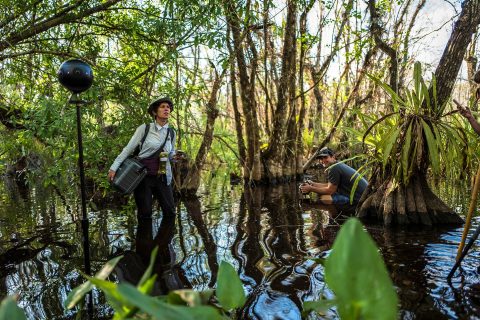Journalism (BA)
Why study Journalism?
Prepare for the future of news. You’ll become a first-rate journalist, and a future decision-maker, capable of thinking critically and leading journalism in new directions. In our program, you can learn a range of current production skills, cover the same events as working journalists, do internships that give you valuable newsroom experience, and graduate functionally bilingual.
Your professional training balances practical skills with theory and analysis. Our production workshops apply newsroom standards to every assignment, and our seminars focus on the social, economic, political and ideological contexts in which journalism is practised.
You’ll benefit from small class sizes and state-of-the-art facilities that replicate modern newsrooms. We equip you with the storytelling tools you need to work in journalism and to adapt to this ever-changing profession.
You’ll graduate a skilled journalist, able to think critically about your profession and our society.
Program highlights
- Our facilities include state-of-the-art media technology, digital and broadcast labs and studio facilities.
- Several awards and scholarships are available to journalism students
Special funding for out-of-province students
Up to $4000 for undergraduate programs.
Program structure
A Bachelor of Arts degree takes a minimum of three to four years (90 – 120 credits) of full-time study, depending on your academic background.
Program option
- Major in Journalism (45 credits)
To graduate with a Major in Journalism, you must demonstrate a working knowledge of French. This can be demonstrated in two ways:
- A test of oral proficiency (interview) in French to be taken during your first year of study
OR - Pass course FRAN 305 (note that you may be required to take prerequisite courses prior to FRAN 305)
You are not required to demonstrate working knowledge of French if:
- You attended a French-language high school (you must provide a copy of your transcript from the school and not the government)
OR - You attended a French CEGEP
OR - You are an international student paying international student fees up to your time of graduation.
Students in the 45-credit BA Major must declare a second major or a minor in another discipline (such as history or political science).
Courses
Co-op program and internship opportunities
Internships for credit
Upper-year undergraduates may undertake a practicum at a recognized media outlet, under the supervision of a senior journalist and with permission of the Department’s undergraduate program director for course credit.
Paid internships
Opportunities for paid internships in journalism and related fields are available to students on a competitive basis. Former students have interned at a plethora of sites, including The Montreal Gazette, Sportsnet, The Eastern Door and CJAD.
United States students: A U.S. Federal Student Aid-eligible version of this program is offered. This version meets all U.S. regulations (such as no co-operative education or e-courses) for eligible programs.
Admission criteria
Minimum cut-off averages and course requirements
- Quebec CEGEP: 22
- High School: B-
- ACT or SAT is NOT required
- Canadian curricula course requirements
- Accepted international qualifications
- International Baccalaureate (IB) diploma: 27
- International Baccalaureate Career-related Programme (CP): 4.5/7
- Baccalauréat français: 12
- British system of education (GCE):
- A-levels: At least two A-level exams CD or
- AS-levels: At least 4 AS-level exams with equivalent results or
- BTEC: Level 3 Diploma or Extended Diploma in a related subject area with equivalent results
- Additional information for British System of Education (GCE) applicants
- University Transfers (internal/external): B-
Additional requirements for admission
The following items must be uploaded to Concordia University:
- Journalism Dossier
Minimum cut-off averages should be used as indicators. The cut-off data may change depending on the applicant pool. Applicants who meet the stated minimum requirements are not guaranteed admission to these programs.
Application deadlines

FALL ENTRY (September)
Deadline: March 1
U.S. and international applicants: Apply no later than February 1 to allow time for immigration document processing. However, applying earlier is strongly recommended. Immigration processing times vary by country, and delays could prevent you from starting your studies on time.

WINTER ENTRY (January)
Admission to this program is available for the Fall Term only.
We reserve the right to close admission to a program at any time after the official deadline without prior notice.
After your degree
After graduation, you’ll join the ranks of successful alumni who inform and entertain hundreds of thousands of readers, listeners and viewers every day. They report everywhere, from Afghanistan to London. They write about arts and culture, cover local beats for community newspapers, anchor and produce broadcasts, and establish blogs on innumerable topics.
But you are not bound to the field of journalism. Your journalistic skills might take you down many possible career paths, including:
- Print, broadcast or web-based media
- Law
- Diplomacy
- Public relations and corporate communications
- Advertising
Student story

Sara Comadina
Major in Journalism (Co-op)
Minor in Spanish, Hispanic Cultures and Literatures
Sara Comadina boosted her résumé through Co-op experiences that combined creativity with journalism.

Olivier Paiement
Major in Journalism
Minor in History
My main goal was to work in sports media, so Concordia was my top choice because of its Journalism program in English.
Other programs of interest

We are one of the most established and respected Communication Studies programs in North America, and are well known for combining creative media production with the study of media theory, criticism and history.
Department
Department of Communication Studies
Faculty

When you study public policy analysis, policy advocacy and community economic development, you’ll graduate ready to jump into in the policy-making process in private, public, and community sectors.
Department
School of Community and Public Affairs
Faculty

We are one of the most established and respected Communication Studies programs in North America, and are well known for combining creative media production with the study of media theory, criticism and history.
Department
Department of Communication Studies
Faculty

